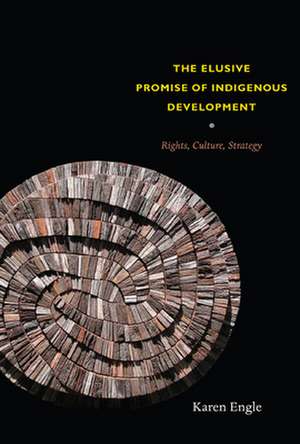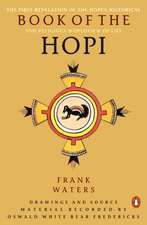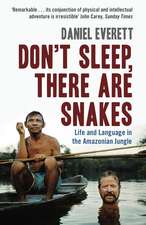The Elusive Promise of Indigenous Development – Rights, Culture, Strategy
Autor Karen Engleen Limba Engleză Paperback – 16 sep 2010
Preț: 304.47 lei
Nou
Puncte Express: 457
Preț estimativ în valută:
58.27€ • 60.61$ • 48.10£
58.27€ • 60.61$ • 48.10£
Carte tipărită la comandă
Livrare economică 15-29 aprilie
Preluare comenzi: 021 569.72.76
Specificații
ISBN-13: 9780822347699
ISBN-10: 0822347695
Pagini: 424
Dimensiuni: 155 x 233 x 28 mm
Greutate: 0.58 kg
Editura: MD – Duke University Press
ISBN-10: 0822347695
Pagini: 424
Dimensiuni: 155 x 233 x 28 mm
Greutate: 0.58 kg
Editura: MD – Duke University Press
Cuprins
Acknowledgments; IntroductionPart I. International and Transnational Indigenous Movements1. Setting the Stage for the Transnational Indigenous Rights Movement: Domestic and International Law and Politics; 2. Indigenous Movements in the Americas in the 1970s: The Fourth World Movement and Pan-indigenism; 3. International Institutions and Indigenous Advocacy in the 1980s and 1990s: Self-Determination Claims; 4. International Indigenous Advocacy in the 1980s: Following the Model of a Human Right to CulturePart II. Human Rights and the Uses of Culture in Indigenous Rights Advocacy5. Culture as Heritage; 6. Culture as Grounded in Land; 7. Culture as DevelopmentPart III. Indigenous Models in Other Contexts: The Case of Afro-Colombians8. The History of Law 70: Culture as Heritage, Land, and Development; 9. The Periphery of Law 70: Afro-Colombians in the CaribbeanConclusion; Notes; Bibliography; Index
Recenzii
The Elusive Promise of Indigenous Development takes the analysis of indigenous rights advocacy and the politics of self-determination to a new level, and it brings legal and cultural struggles together in a breathtaking big picture. It is up to the moment in terms of its political scope, richly historicized, and filled with comparative and critical analysis for rethinking indigenous political movements and their enduring (and sometimes problematic) implications.--J. Kehaulani Kauanui, author of Hawaiian Blood: Colonialism and the Politics of Sovereignty and IndigeneityIf you are interested in indigenous rights, social lawyering, and the strange alchemy by which identity is transformed into right, you will want to read this book. Karen Engle has written a powerful history of the indigenous rights movement, which is simultaneously a meditation on the nature of identity and a primer on international legal strategy.--David Kennedy, author of The Dark Sides of Virtue: Reassessing International HumanitarianismCould culture be, in part, the culprit? This question will not be well-received by those interlocutors--activists, scholars, and activist intellectuals alike--who are unwilling to subject the premises of their work to sustained critical scrutiny. For the others, Karen Engles text will be immensely rewarding: an invitation to take stock of how far indigenous struggles have advanced over the past four decades, with right to culture at front and center, and a call to reflect on the limitations of this political-legal approach. She argues that the right to culture has indeed become part of the problem; and that an alternative anti-essentialist notion of culture could deliver more favorable political results. These are crucial assertions to engage and assess, for those on the front lines of indigenous struggles and, by extension, for scholars as well. We are indebted to Engle for putting them on our agenda with such lucidity.--Charles R. Hale, Director, Teresa Lozano Long Institute of Latin American Studies, University of Texas at Austin
"The Elusive Promise of Indigenous Development takes the analysis of indigenous rights advocacy and the politics of self-determination to a new level, and it brings legal and cultural struggles together in a breathtaking big picture. It is up to the moment in terms of its political scope, richly historicized, and filled with comparative and critical analysis for rethinking indigenous political movements and their enduring (and sometimes problematic) implications."--J. Kehaulani Kauanui, author of Hawaiian Blood: Colonialism and the Politics of Sovereignty and Indigeneity "If you are interested in indigenous rights, social lawyering, and the strange alchemy by which identity is transformed into right, you will want to read this book. Karen Engle has written a powerful history of the indigenous rights movement, which is simultaneously a meditation on the nature of identity and a primer on international legal strategy."--David Kennedy, author of The Dark Sides of Virtue: Reassessing International Humanitarianism "Could culture be, in part, the culprit? This question will not be well-received by those interlocutors--activists, scholars, and activist intellectuals alike--who are unwilling to subject the premises of their work to sustained critical scrutiny. For the others, Karen Engle's text will be immensely rewarding: an invitation to take stock of how far indigenous struggles have advanced over the past four decades, with 'right to culture' at front and center, and a call to reflect on the limitations of this political-legal approach. She argues that the 'right to culture' has indeed become part of the problem; and that an alternative 'anti-essentialist' notion of culture could deliver more favorable political results. These are crucial assertions to engage and assess, for those on the front lines of indigenous struggles and, by extension, for scholars as well. We are indebted to Engle for putting them on our agenda with such lucidity."--Charles R. Hale, Director, Teresa Lozano Long Institute of Latin American Studies, University of Texas at Austin
"The Elusive Promise of Indigenous Development takes the analysis of indigenous rights advocacy and the politics of self-determination to a new level, and it brings legal and cultural struggles together in a breathtaking big picture. It is up to the moment in terms of its political scope, richly historicized, and filled with comparative and critical analysis for rethinking indigenous political movements and their enduring (and sometimes problematic) implications."--J. Kehaulani Kauanui, author of Hawaiian Blood: Colonialism and the Politics of Sovereignty and Indigeneity "If you are interested in indigenous rights, social lawyering, and the strange alchemy by which identity is transformed into right, you will want to read this book. Karen Engle has written a powerful history of the indigenous rights movement, which is simultaneously a meditation on the nature of identity and a primer on international legal strategy."--David Kennedy, author of The Dark Sides of Virtue: Reassessing International Humanitarianism "Could culture be, in part, the culprit? This question will not be well-received by those interlocutors--activists, scholars, and activist intellectuals alike--who are unwilling to subject the premises of their work to sustained critical scrutiny. For the others, Karen Engle's text will be immensely rewarding: an invitation to take stock of how far indigenous struggles have advanced over the past four decades, with 'right to culture' at front and center, and a call to reflect on the limitations of this political-legal approach. She argues that the 'right to culture' has indeed become part of the problem; and that an alternative 'anti-essentialist' notion of culture could deliver more favorable political results. These are crucial assertions to engage and assess, for those on the front lines of indigenous struggles and, by extension, for scholars as well. We are indebted to Engle for putting them on our agenda with such lucidity."--Charles R. Hale, Director, Teresa Lozano Long Institute of Latin American Studies, University of Texas at Austin
Notă biografică
Karen Engle
Textul de pe ultima copertă
"Could culture be, in part, the culprit? This question will not be well received by those interlocutors--activists, scholars and activist intellectuals alike--who are unwilling to subject the premises of their work to sustained critical scrutiny. For the others, Karen Engle's text will be immensely rewarding: an invitation to take stock of how far indigenous struggles have advanced over the past four decades, with 'right to culture' at front and center, and a call to reflect on the limitations of this political-legal approach. She argues that the 'right to culture' has indeed become part of the problem, and that an alternative 'anti-essentialist' notion of culture could deliver more favorable political results. These are crucial assertions to engage and assess, for those on the front lines of indigenous struggles and, by extension, for scholars as well. We are indebted to Engle for putting them on our agenda with such lucidity."--Charles R. Hale, Director, Teresa Lozano Long Institute of Latin American Studies, University of Texas at Austin
Descriere
Examines international indigenous advocacy from the 1970s to today, and considers how questions of culture play into discourses of self-determination and indigenous rights











